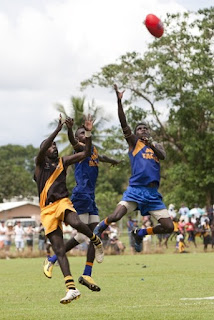It was a great little phase of my life and I made some enduring
friendships but sadly I eventually had to pack up and prepare to
leave Darwin. I’d already covered a lot of miles on my Australian
travels but this would certainly be the longest leg of the journey:
three weeks and 6,000km through the Northern Territory and Western
Australia all the way to Perth. We’d be camping out along the way
and it would be a heck of an adventure…
My travel buddy from Darwin to Broome was a friend from Germany and our
car was a red Ford Falcon called Oma, which is German for
grandmother. There was yellow duct tape holding the front
bumper in place and I added a couple of strips of grey tape to
the windscreen seals to prevent water dripping through. The
engine was sound and tyres were good though. I was glad for
that, especially when I found out we were travelling with no jack
or wrench for the wheel nuts!
 |
| Held together by duct tape - Oma |
Our planned midday departure from Darwin was eventually about 4pm and
we arrived at Katherine Gorge after dark. Compared to when
I was there in September, the campground was virtually deserted and
it became obvious why on our second night there. After a lovely
sunny day spent walking in the national park the rain arrived. My
little tent was no match for the weather and it wasn’t too long
before we began to get swamped! Most of the sleepless night was
spent in the shelter of the camp kitchen playing cards while the rain
hammered down outside.
 |
| The beautiful Katherine Gorge |
After we dried out wet sleeping bags and in Katherine, we headed west
to the mighty Victoria River. The river had delayed our initial
departure from Darwin because it had flooded to about seven metres
over its usual flow. The sandstone cliffs where the highway crosses
the river create a dramatic setting and it was easy to imagine the
water raging under the bridge near the Victoria River Roadhouse.
This roadhouse had a sign announcing that instead of being ‘under
the management’ the owner was ‘under a new wife’!
 |
| Victoria River Roadhouse |
We ended up in a little place called Timber Creek – population 230
people. This is the only town between Katherine and Kunnunara. It
has an interesting history for such a small place and is on the edge
of the Gregory National Park but after our woes the previous night we
were more interested in catching up on some lost sleep!
Before arriving in Kunnunara we had to negotiate the NT/WA border
crossing. We were surprised and a little bemused how strictly this
is controlled by the quarantine inspection station which demanded
that we give up all our fruit, vegetables, nuts and honey. The irony
of it was that if we were travelling the other way there are
virtually no checks! In other words, Western Australia is paranoid
and the Territory doesn’t really care!
 |
| Feeding the tame wallabies |
After having eating some things, declaring others and hiding a stash
deep in the car boot we managed to nervously clear the border. After
setting our watches back 90 minutes to WA time, we soon found
ourselves in Kunnunara. It's a relaxed place set amid lush
farmland and tropical fruit plantations and we decided to spend a
couple of nights. As expected, it rained again while we were there
but lessons had been well learnt and we put the tent under some
shelter this time.










